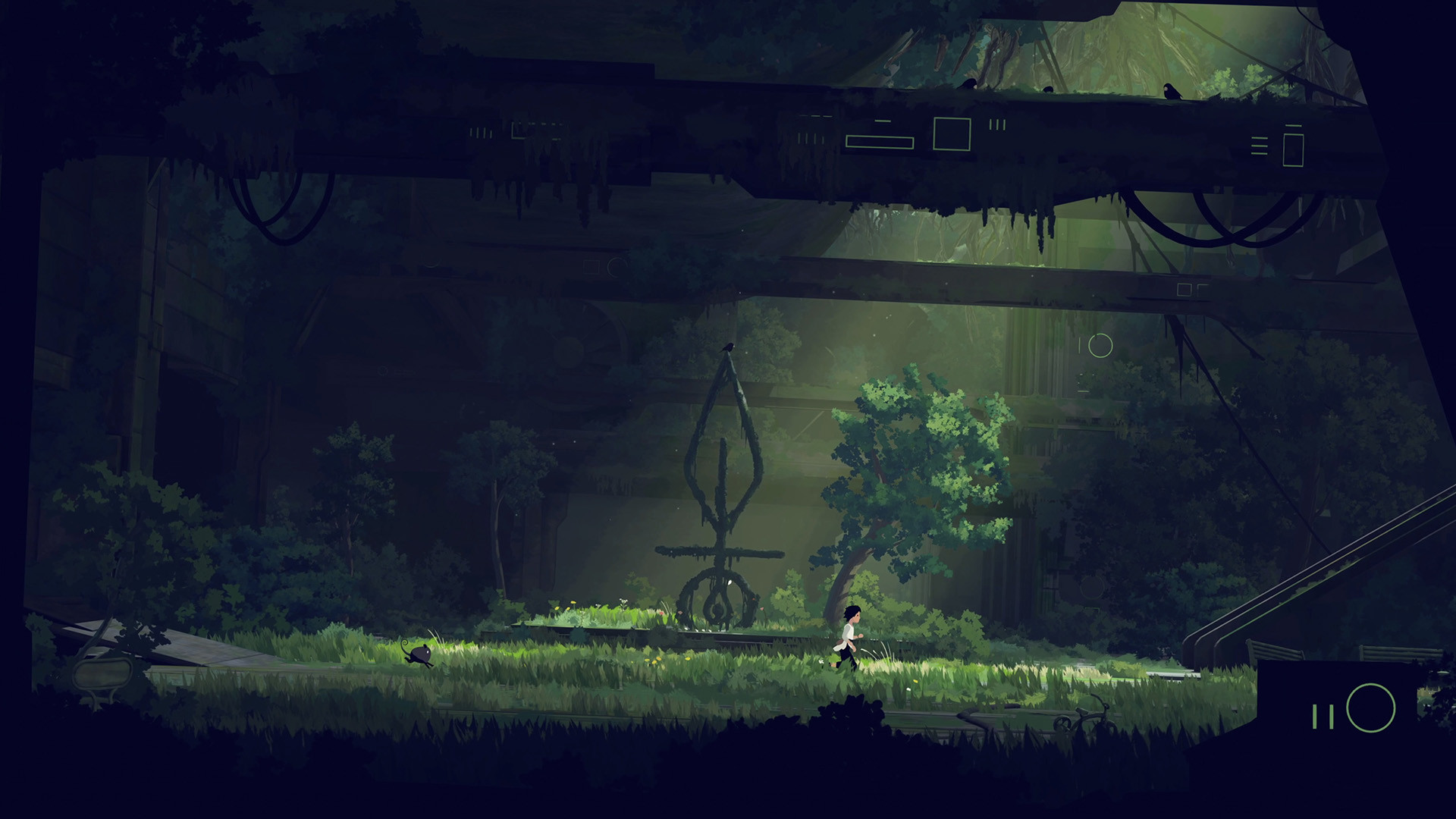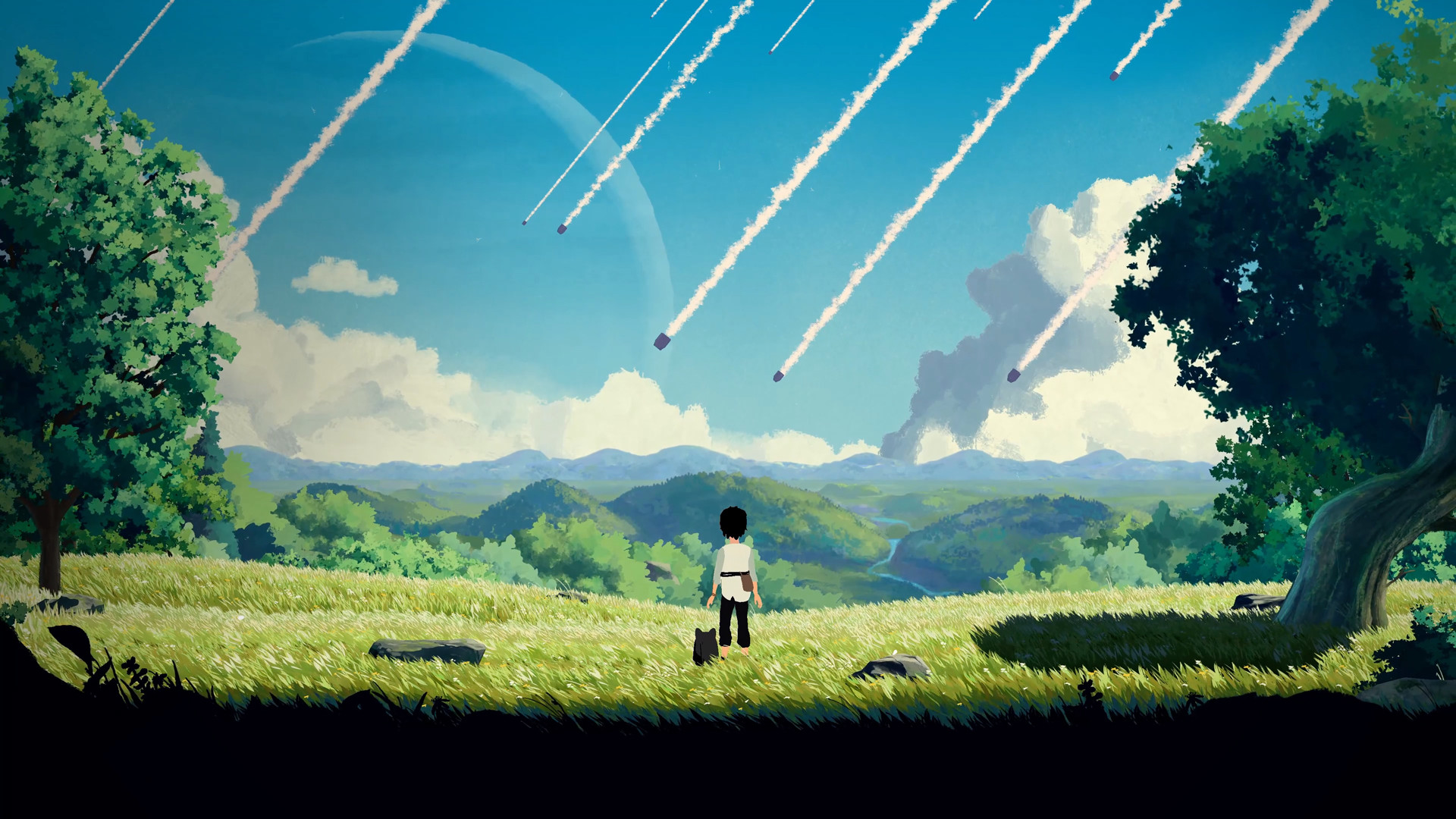Wishfully’s Planet of Lana begins with the main character, Lana chasing her older sister, Ilo. As the two weave through their coastal village, we see its residents bustling, going about their day, running the market or the local butcher. The entire sequence introduces us to the sisters and is an easy tutorial for the platforming mechanics.
However, things quickly take a turn when mysterious machines suddenly enter the planet’s atmosphere. Ilo is kidnapped, and as Lana returns to the village, the once-peaceful surroundings are smoldering, the screams of its residents echoing throughout. The machines capture everyone to some mysterious end, and the previously playful chase gives way to a tense and desperate attempt to escape, as your stealth skills are tested.
“Everything is exquisitely presented, with slow zoom-outs emphasizing the scale of the world and its beauty, while the framing creates this overwhelming contrast.”
This contrast is just one example of Planet of Lana’s incredible attention to detail. The narrative effortlessly flows from a peaceful setting to one of strife while acquainting you with the gameplay, world, and characters. Lana is motivated to find her sister, and given her relatively young age, it’s unlikely she knows what awaits out in the wilderness. The fauna and flora encountered are almost as foreign to her as the player, and you start to question the planet’s very nature.
What exactly is happening, why the machines are kidnapping humans, and much more slowly unfolds throughout the narrative. There are no subtitles for the unique language that Lana and her people speak (which makes the initial game of chase much more significant in learning her sister’s name). As a result, much of the storytelling is through the environment. You’ll witness other villages abandoned or assailed, likely due to the machines, but also uncover dark caves brimming with secrets.
Each location tells a story, and the cutscenes flow naturally with the pacing, either as gorgeous establishing shots of environments or highlighting what seems to be the machines’ mothership. Everything is exquisitely presented, with slow zoom-outs emphasizing the scale of the world and its beauty, while the framing creates this overwhelming contrast. Lana isn’t your typical hero, and she’s definitely out of her depth, but she’ll do anything to save her sister.
Of course, Lana doesn’t undertake the journey alone. A small creature named Mui, whom she rescues from a machine’s trap, accompanies her. Mui climbs through environments easily, leaping up to bring down a rope for Lana to climb. It can also navigate tight spaces that Lana can’t crawl through, venture down holes to distract enemies and much more.
“The puzzles feel natural and rationally thought-out – examining your surroundings and an enemy’s patterns, along with some moderately good reflexes, is often the path to success.”
Mui also needs help, since it isn’t a fan of swimming and can’t break through boarded-up areas. There are times when you’ll build bridges for each character, helping the other to cross. As they overcome more hardships, the dynamic between Lana and Mui evolves. In addition to jumping, climbing and dropping down from ledges, Lana can also issue commands to Mui. You can tell it to follow or stay and specify a target location. It seems simple, but the initial puzzles do an incredible job of playing with this dynamic.
You’ll start with Mui staying on some weird fauna to create a bridge for Lana to cross. Then you’re instructing Mui to go down a hole to distract a machine while climbing around it with Lana or distracting a giant creature with her and then escaping before it can reach while commanding Mui to activate a light to keep it at bay. The puzzles grow in complexity, especially when introducing new mechanics, but it’s to Planet of Lana’s credit that it naturally eases you in.
Since Lana and Mui need to survive each encounter, there may have been some frustration with each failure. However, the puzzles feel natural and rationally thought-out – examining your surroundings and an enemy’s patterns, along with some moderately good reflexes, is often the path to success. And even if you die, a healthy amount of checkpoints and fast loading times ensure you’re quickly back in the action.
Lana does feel less floaty than your average platforming hero (or Mui). You’ll have to account for momentum while jumping – no changing directions in mid-air. Nevertheless, the controls feel responsive and natural. It takes some time to get used to directing Mui to certain spots since the cursor somewhat snaps to vantage points, but it becomes seamless enough to handle.
“However, it’s all the more incredible how Wishfully also captures the themes of family, becoming attuned to the environment, and survival, instead of brutal killing.”
Visually, Planet of Lana is gorgeous. The environments and backgrounds look hand painted and animate realistically, whether you’re traversing a forest or gazing upon the horizon as the ocean stretches out. No scene feels extraneous or excessive in its details. The lighting and color palette reflect the tone of various situations, from bright and wondrous to dark and mysterious, without being too overpowering or overstated. At times, it’s like a balancing game, one that successfully defines the experience.
However, it’s all the more incredible how Wishfully also captures the themes of family, becoming attuned to the environment, and survival, instead of brutal killing. The animations are also impeccable. Lana will tilt her head towards objects of interest, and the machines shift seamlessly from searching and scanning to outright hostility.
Then there’s the soundtrack and effects. Orchestrations swell joyfully as Lana chases Ilo and boom with tension when the machines land. It’s understated but still somewhat positive when traveling with Mui, as the sound of birds and the wind carries through different environments. And even without understanding the language, the voice work is stellar. Hearing Lana’s intonation change based on the situation and Mui chuckling at times further reinforces their camaraderie.
In many ways, Planet of Lana is reminiscent of Playdead’s Inside. It’s tautly paced with well-executed puzzles but also carried by an undercurrent of mystery as you delve further into the world, keen on getting answers. Plus, they both have that same feeling of the world being out to get you.
“Overall, Planet of Lana is a beautiful experience with tight gameplay, a compelling and well-designed world, and a strong narrative anchored by two likeable leads and an imposing threat.”
Planet of Lana differs in the connection between Lana, Mui and the world itself. Instead of various enemies and occurrences instilling isolation as more surreal events occur, there is a feeling of empathy to go with the wonder. The world is dangerous, but it can also be beautiful; lending its aid or opposing you equally.
In terms of performance, the game ran flawlessly with no issues whatsoever on PC. I spotted one bug, which had no impact on my experience. Though rebindable controls aren’t available, Wishfully has assured that they’ll be patched, along with accessibility features and an option to turn off the UI, as soon as possible. Not that the lack of such options affected my experience – even the default controls felt great – but it’s nice to have them.
Some minor puzzles may have been trimmed to further tighten the pacing. There also isn’t much by way of replay value – there are hidden areas and chapter selection to revisit previous sections, and that’s it. Not that it’s a detriment in any way. It’s hard to find any fault at all, really.
Overall, Planet of Lana is a beautiful experience with tight gameplay, a compelling and well-designed world, and a strong narrative anchored by two likeable leads and an imposing threat. This year – heck, even this quarter – could see it fall under the radar of some big blockbusters. However, the odyssey of Lana and Mui is worth undertaking and remembering.
This game was reviewed on PC.
Planet of Lana Review – Spirited Away
Source: News Beginning




0 Comments